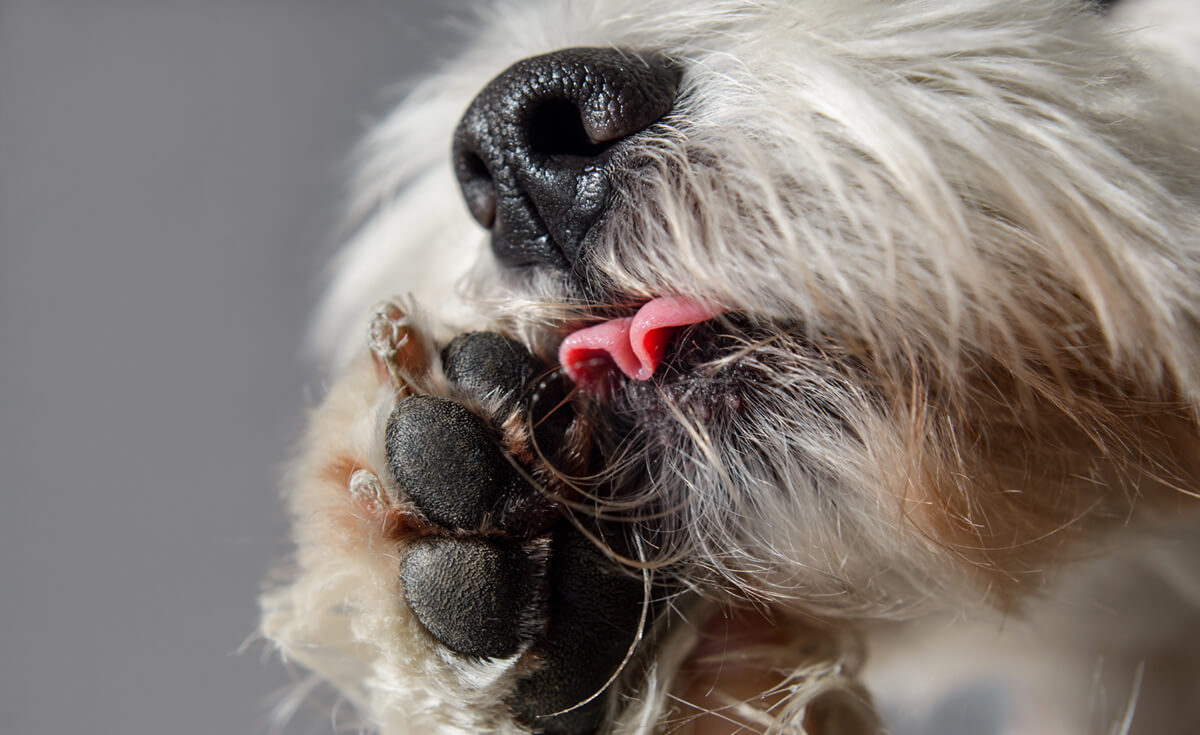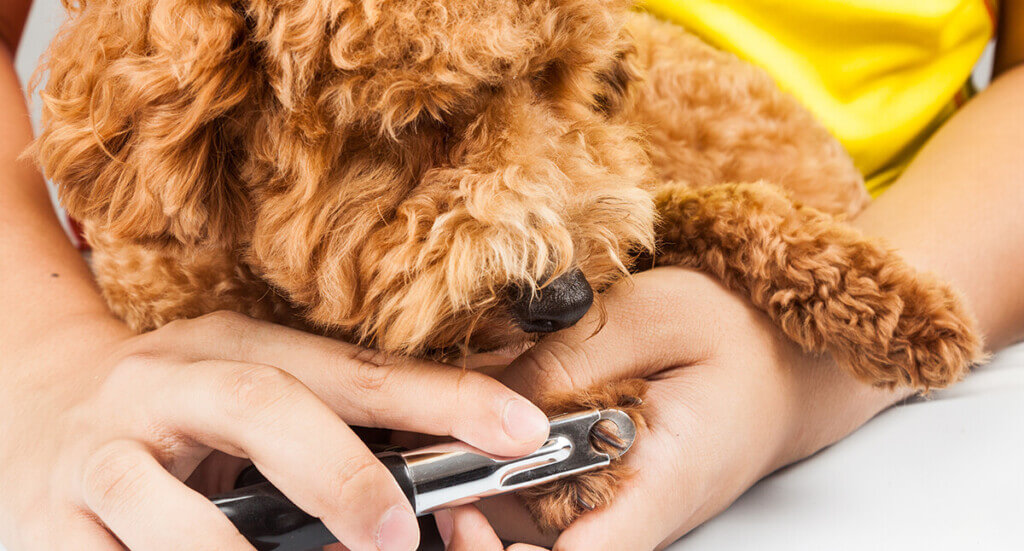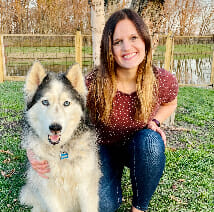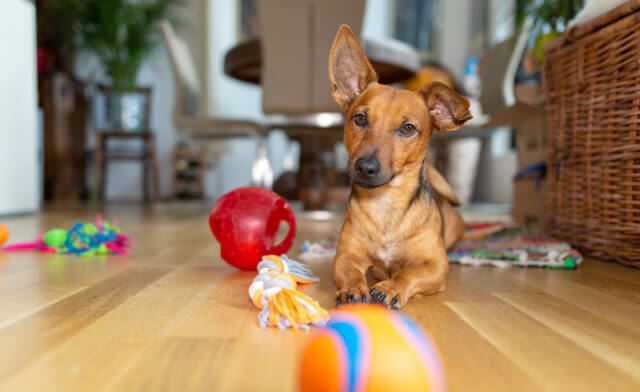Why Do Dogs Lick Their Paws? Understanding the Behavior and Potential Causes
As pet owners, we often observe our furry friends engaging in various behaviors that can sometimes leave us puzzled. One common behavior that many dogs exhibit is licking their paws. But why do dogs lick their paws? Is it just a grooming habit, or could it be a sign of an underlying issue? In this article, we’ll explore the different reasons why dogs lick their paws, how to determine if it’s a cause for concern, and what steps you can take to address the behavior and ensure your dog’s well-being.

Normal Grooming: A Paw Maintenance Routine
Just like cats, dogs engage in regular grooming behaviors to keep themselves clean. Occasional paw licking is a normal part of their self-care routine. After a walk, for example, dogs may lick their paws briefly to remove any dirt or debris they may have picked up along the way. This is a natural and harmless behavior that helps maintain their hygiene. If your dog only licks their paws occasionally and for a short duration, there’s usually no cause for concern.
Excessive Paw Licking: Potential Causes
While occasional paw licking is normal, constant or aggressive paw licking may indicate an underlying issue. Here are several common reasons why dogs excessively lick their paws:
1. Injury or Irritation
One possible cause of excessive paw licking is an injury or irritation. Dogs may step on sharp objects, hot pavement, or encounter thorns or insect bites that cause discomfort. Additionally, foreign objects like splinters or grass awns can become embedded in their paws, leading to irritation and increased licking. If you notice your dog focusing on one paw more than others or limping, it’s essential to inspect their paws carefully for any signs of injury or foreign objects.
2. Allergies
Both food and environmental allergies are common causes of itchy paws and paw licking in dogs. Just like humans, dogs can develop allergic reactions to certain substances, such as pollen, grass, dust mites, or specific ingredients in their food. If your dog is constantly licking their paws, especially during specific seasons or after exposure to certain allergens, allergies may be the underlying cause.
3. Skin Infections
Bacterial or fungal/yeast infections can also lead to excessive paw licking in dogs. When dogs constantly lick their paws, it creates a moist environment that is susceptible to bacterial infections and fungal growth. These infections can occur as a result of underlying allergies, environmental factors, or for unknown reasons. It’s important to seek veterinary attention if you suspect your dog has a skin infection to prevent further complications.
4. Pain or Discomfort
Dogs may lick their paws as a response to pain or discomfort, even if the source of the pain is not in the paw itself. Dogs have an instinct to hide their pain, making it challenging to pinpoint the exact cause. If your dog is continuously licking their paws and other parts of their body, it’s crucial to consider whether they may be experiencing pain or discomfort elsewhere.
5. Anxiety or Stress
Just like humans, dogs can experience anxiety and stress, which may manifest as excessive paw licking. Boredom, separation anxiety, or fear can trigger this behavior. Dogs may find comfort in licking their paws as a self-soothing mechanism. If you suspect your dog’s paw licking is due to anxiety or stress, it’s important to address the underlying cause and provide appropriate behavioral support.
6. Food Allergies
Food allergies can also lead to paw licking in dogs. Certain ingredients in your dog’s diet may trigger an allergic reaction, causing itchiness and discomfort in their paws. If you suspect a food allergy, consult with your veterinarian to determine the best course of action and explore potential dietary changes or elimination diets.
7. Behavioral Issues
In some cases, excessive paw licking may be a behavioral issue. Dogs can develop compulsive tendencies that lead them to obsessively lick their paws. This behavior may have initially started due to boredom and gradually developed into a habit. Addressing behavioral issues may require the guidance of a professional dog trainer or behaviorist to develop a tailored treatment plan.
Assessing the Situation: When to Seek Veterinary Attention
Determining whether your dog’s paw licking is a cause for concern can be challenging. As a pet owner, it’s crucial to monitor their behavior closely and look for any signs of distress or visible abnormalities. If you notice any of the following, it’s recommended to seek veterinary attention:
- Persistent, aggressive, or obsessive paw-licking
- Visible signs of injury, such as cuts, swelling, or bleeding
- Redness, irritation, or discharge in the paw area
- Foul odor or unusual changes in the appearance of the paws
- Changes in your dog’s overall behavior, appetite, or energy levels
Your veterinarian will be able to examine your dog, conduct any necessary tests or diagnostics, and provide a proper diagnosis. They can determine the underlying cause of the excessive paw licking and recommend appropriate treatment options.
Addressing Excessive Paw Licking: Prevention and Treatment
Once you have identified the cause of your dog’s excessive paw licking, there are several steps you can take to address the behavior and provide relief:
1. Preventative Measures
- Regular paw checks: Make it a habit to inspect your dog’s paws regularly for any signs of injury, foreign objects, or abnormalities.
- Clean paws after walks: Wipe your dog’s paws with a clean, damp cloth after outdoor activities to remove any potential allergens or irritants.
- Keep nails trimmed: Regularly trim your dog’s nails to prevent overgrowth, which can cause discomfort and increase the likelihood of paw licking.

2. Treating Underlying Conditions
- Allergy management: If allergies are the underlying cause, work with your veterinarian to identify and manage specific allergens through dietary changes, medication, or allergy shots.
- Infection treatment: If a bacterial or yeast infection is present, your veterinarian may prescribe topical or oral medications to combat the infection and relieve symptoms.
- Pain management: If pain or discomfort is the cause, your veterinarian will determine the appropriate pain management strategy, which may include medication or alternative therapies.
- Behavioral support: For dogs with anxiety or stress-related paw licking, behavior modification techniques, environmental enrichment, and, in severe cases, medication may be recommended.
3. Home Care and Remedies
- Paw care products: Use pet-safe paw balms or moisturizers to soothe and protect your dog’s paw pads.
- Bathing and grooming: Regular bathing with a gentle dog shampoo can help alleviate itchiness and remove potential allergens or irritants from your dog’s coat and paws.
- Environmental modifications: Make adjustments to your dog’s environment to reduce stress triggers and provide mental stimulation, such as interactive toys or puzzles.
4. Professional Guidance
If the excessive paw licking persists or you’re unsure about the underlying cause, it’s essential to consult a professional, such as a veterinarian or a certified dog trainer. They can provide expert guidance and develop a tailored treatment plan to address the behavior effectively.
Remember, each dog is unique, and the approach to addressing excessive paw licking may vary depending on the underlying cause. By working closely with your veterinarian and implementing appropriate measures, you can help your furry friend find relief and maintain their paw health.
Conclusion
Understanding why dogs lick their paws is crucial for identifying potential issues and ensuring your dog’s well-being. While occasional paw licking is normal, excessive or aggressive paw licking may indicate an underlying problem that requires attention. By observing your dog’s behavior, seeking veterinary advice, and taking appropriate preventative and treatment measures, you can address the behavior and provide relief for your furry friend. Remember, your dog’s paw health is an essential aspect of their overall wellness, so be proactive in caring for their paws and addressing any concerns that arise.




